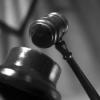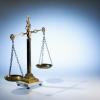Search Results

A Guide to the Second AmendmentThe Second Amendment, or Amendment II, of the United States Constitution is the amendment and the section of the Bill of Rights that says that people have the right to keep and bear arms. The Second Amendment was adopted into the United States Constitution on December 15, 1791, along with the other amendments in the Bill of Rights. The Second Amen..

A Guide to the Seventh AmendmentThe Seventh Amendment, or Amendment VII of the United States Constitution is the section of the Bill of Rights that guarantees a jury trial for civil cases in the federal courts. However, this type of case is usually not heard anymore in the federal court system. The Seventh Amendment was introduced as a part of the Bill of Rights into the United..

A Guide to the Tenth AmendmentThe Tenth Amendment, or Amendment X of the United States Constitution is the section of the Bill of Rights that basically says that any power that is not given to the federal government is given to the people or the states. The Tenth Amendment of the Bill of Rights put into the United States Constitution on September 5, 1789 and was voted for by 9 ..

Terry v. Ohio: The BackgroundMartin McFadden was a police officer in Ohio who noticed that two individuals appeared to be acting suspiciously. While watching these people from his police car, Officer McFadden noticed that these two men appeared to be planning a criminal attack. The two men were walking back and forth in front of a store while conspiring with each other. When Mc..

Texas v. Johnson: The BackgroundThe case of Texas v. Johnson revolves around the 1984 Republican National Convention which took place in Dallas, Texas. At this event, Gregory Lee Johnson engaged in a protest by setting fire to the American flag. Gregory Lee Johnson was a member of a private company that was made-up of individuals who promoted the Communist movement. Johnso..

A Guide to the Third AmendmentThe Third Amendment, or Amendment III of the United States Constitution is the section of the Bill of Rights that prohibits soldiers from temporarily residing in private homes during peace time without getting the permission and consent of the owner. It is only legal to do this when it is wartime it must still follow the law. The third amendment wa..

Founding Father: Thomas JeffersonThomas Jefferson was a founding father of the United States, an author of the Declaration of Independence, and the 3rd President of the United States. Aside from being President, Thomas Jefferson was also a legislator, diplomat, lawyer architect, scientist, inventor, writer, agriculturist, and a revolutionary thinker.Early Life of Thomas Jeffers..

Founding Father: Thomas NelsonThomas Nelson, Jr. was born at Yorktown, Virginia on December 26, 1738. He was the son of Elizabeth Burwell and William Nelson. Like many other people from Virginia, Thomas went to England to go to school. He went to Eton, a school from boys between the ages of 13-18, and afterwards, he went to Christ’s College, which was at Cambridge University...

Founding Father: Thomas PaineEarly LifeUnlike many other American Patriots, Thomas Paine was not born in America. He was born in on January 29, 1737 in Thetford, England. Thomas Paine’s father made a living making corsets. Thomas Paine attended Thetford Grammar school, but flunked out at the age of 12. When he was 13, he helped his father at the corset shop, but he was not go..

United States v. Lopez: The BackgroundThe United States v. Lopez case was the first United States Supreme Court case since the early 1930’s to create laws that limit Congress’s power. The United States v. Lopez case begins with a man named Alfonzo Lopez. Mr. Lopez was a High School Senior in San Antonio, Texas. On March 10th of 1992, Lopez carried a concealed handgun into s..

What Does We the People Mean?"We the People" is a phrase that comes from the Preamble of the United States Constitution. In the Preamble of the United States, it talks about what the purpose of the Constitution, and what principles guide it. Where Does "We The People" Show Up?"We the People" is in the very first sentence of the United States Constitution. Here is the text ..

Founding Father: William PatersonWilliam Paterson was born in County Antrim, Ireland, in on December 14, 1745. When he was almost 2 years old, his family moved from Ireland to America. While his father traveled around the country, selling tin products, William Paterson’s family lived in New London, other areas of Connecticut, and Trenton, New Jersey. In 1750, William Paterson..

Worcester v. Georgia: The BackgroundWorcester v. Georgia deals with Georgia state laws that were passed in the middle of the 1800s. These laws were passed following an agreement reached between the Cherokee tribe and the state government of Georgia. The laws instituted a prohibition of non-Indians from living in Indian territories. Only Non-Native Americans with special permiss..
 A Guide to the Second AmendmentThe Second Amendment, or Amendment II, of the United States Constitution is the amendment and the section of the Bill of Rights that says that people have the right to keep and bear arms. The Second Amendment was adopted into the United States Constitution on December 15, 1791, along with the other amendments in the Bill of Rights. The Second Amen..
A Guide to the Second AmendmentThe Second Amendment, or Amendment II, of the United States Constitution is the amendment and the section of the Bill of Rights that says that people have the right to keep and bear arms. The Second Amendment was adopted into the United States Constitution on December 15, 1791, along with the other amendments in the Bill of Rights. The Second Amen.. A Guide to the Seventh AmendmentThe Seventh Amendment, or Amendment VII of the United States Constitution is the section of the Bill of Rights that guarantees a jury trial for civil cases in the federal courts. However, this type of case is usually not heard anymore in the federal court system. The Seventh Amendment was introduced as a part of the Bill of Rights into the United..
A Guide to the Seventh AmendmentThe Seventh Amendment, or Amendment VII of the United States Constitution is the section of the Bill of Rights that guarantees a jury trial for civil cases in the federal courts. However, this type of case is usually not heard anymore in the federal court system. The Seventh Amendment was introduced as a part of the Bill of Rights into the United.. A Guide to the Tenth AmendmentThe Tenth Amendment, or Amendment X of the United States Constitution is the section of the Bill of Rights that basically says that any power that is not given to the federal government is given to the people or the states. The Tenth Amendment of the Bill of Rights put into the United States Constitution on September 5, 1789 and was voted for by 9 ..
A Guide to the Tenth AmendmentThe Tenth Amendment, or Amendment X of the United States Constitution is the section of the Bill of Rights that basically says that any power that is not given to the federal government is given to the people or the states. The Tenth Amendment of the Bill of Rights put into the United States Constitution on September 5, 1789 and was voted for by 9 .. Terry v. Ohio: The BackgroundMartin McFadden was a police officer in Ohio who noticed that two individuals appeared to be acting suspiciously. While watching these people from his police car, Officer McFadden noticed that these two men appeared to be planning a criminal attack. The two men were walking back and forth in front of a store while conspiring with each other. When Mc..
Terry v. Ohio: The BackgroundMartin McFadden was a police officer in Ohio who noticed that two individuals appeared to be acting suspiciously. While watching these people from his police car, Officer McFadden noticed that these two men appeared to be planning a criminal attack. The two men were walking back and forth in front of a store while conspiring with each other. When Mc.. Texas v. Johnson: The BackgroundThe case of Texas v. Johnson revolves around the 1984 Republican National Convention which took place in Dallas, Texas. At this event, Gregory Lee Johnson engaged in a protest by setting fire to the American flag. Gregory Lee Johnson was a member of a private company that was made-up of individuals who promoted the Communist movement. Johnso..
Texas v. Johnson: The BackgroundThe case of Texas v. Johnson revolves around the 1984 Republican National Convention which took place in Dallas, Texas. At this event, Gregory Lee Johnson engaged in a protest by setting fire to the American flag. Gregory Lee Johnson was a member of a private company that was made-up of individuals who promoted the Communist movement. Johnso.. A Guide to the Third AmendmentThe Third Amendment, or Amendment III of the United States Constitution is the section of the Bill of Rights that prohibits soldiers from temporarily residing in private homes during peace time without getting the permission and consent of the owner. It is only legal to do this when it is wartime it must still follow the law. The third amendment wa..
A Guide to the Third AmendmentThe Third Amendment, or Amendment III of the United States Constitution is the section of the Bill of Rights that prohibits soldiers from temporarily residing in private homes during peace time without getting the permission and consent of the owner. It is only legal to do this when it is wartime it must still follow the law. The third amendment wa.. Founding Father: Thomas JeffersonThomas Jefferson was a founding father of the United States, an author of the Declaration of Independence, and the 3rd President of the United States. Aside from being President, Thomas Jefferson was also a legislator, diplomat, lawyer architect, scientist, inventor, writer, agriculturist, and a revolutionary thinker.Early Life of Thomas Jeffers..
Founding Father: Thomas JeffersonThomas Jefferson was a founding father of the United States, an author of the Declaration of Independence, and the 3rd President of the United States. Aside from being President, Thomas Jefferson was also a legislator, diplomat, lawyer architect, scientist, inventor, writer, agriculturist, and a revolutionary thinker.Early Life of Thomas Jeffers.. Founding Father: Thomas NelsonThomas Nelson, Jr. was born at Yorktown, Virginia on December 26, 1738. He was the son of Elizabeth Burwell and William Nelson. Like many other people from Virginia, Thomas went to England to go to school. He went to Eton, a school from boys between the ages of 13-18, and afterwards, he went to Christ’s College, which was at Cambridge University...
Founding Father: Thomas NelsonThomas Nelson, Jr. was born at Yorktown, Virginia on December 26, 1738. He was the son of Elizabeth Burwell and William Nelson. Like many other people from Virginia, Thomas went to England to go to school. He went to Eton, a school from boys between the ages of 13-18, and afterwards, he went to Christ’s College, which was at Cambridge University... Founding Father: Thomas PaineEarly LifeUnlike many other American Patriots, Thomas Paine was not born in America. He was born in on January 29, 1737 in Thetford, England. Thomas Paine’s father made a living making corsets. Thomas Paine attended Thetford Grammar school, but flunked out at the age of 12. When he was 13, he helped his father at the corset shop, but he was not go..
Founding Father: Thomas PaineEarly LifeUnlike many other American Patriots, Thomas Paine was not born in America. He was born in on January 29, 1737 in Thetford, England. Thomas Paine’s father made a living making corsets. Thomas Paine attended Thetford Grammar school, but flunked out at the age of 12. When he was 13, he helped his father at the corset shop, but he was not go.. United States v. Lopez: The BackgroundThe United States v. Lopez case was the first United States Supreme Court case since the early 1930’s to create laws that limit Congress’s power. The United States v. Lopez case begins with a man named Alfonzo Lopez. Mr. Lopez was a High School Senior in San Antonio, Texas. On March 10th of 1992, Lopez carried a concealed handgun into s..
United States v. Lopez: The BackgroundThe United States v. Lopez case was the first United States Supreme Court case since the early 1930’s to create laws that limit Congress’s power. The United States v. Lopez case begins with a man named Alfonzo Lopez. Mr. Lopez was a High School Senior in San Antonio, Texas. On March 10th of 1992, Lopez carried a concealed handgun into s.. What Does We the People Mean?"We the People" is a phrase that comes from the Preamble of the United States Constitution. In the Preamble of the United States, it talks about what the purpose of the Constitution, and what principles guide it. Where Does "We The People" Show Up?"We the People" is in the very first sentence of the United States Constitution. Here is the text ..
What Does We the People Mean?"We the People" is a phrase that comes from the Preamble of the United States Constitution. In the Preamble of the United States, it talks about what the purpose of the Constitution, and what principles guide it. Where Does "We The People" Show Up?"We the People" is in the very first sentence of the United States Constitution. Here is the text .. Founding Father: William PatersonWilliam Paterson was born in County Antrim, Ireland, in on December 14, 1745. When he was almost 2 years old, his family moved from Ireland to America. While his father traveled around the country, selling tin products, William Paterson’s family lived in New London, other areas of Connecticut, and Trenton, New Jersey. In 1750, William Paterson..
Founding Father: William PatersonWilliam Paterson was born in County Antrim, Ireland, in on December 14, 1745. When he was almost 2 years old, his family moved from Ireland to America. While his father traveled around the country, selling tin products, William Paterson’s family lived in New London, other areas of Connecticut, and Trenton, New Jersey. In 1750, William Paterson.. Worcester v. Georgia: The BackgroundWorcester v. Georgia deals with Georgia state laws that were passed in the middle of the 1800s. These laws were passed following an agreement reached between the Cherokee tribe and the state government of Georgia. The laws instituted a prohibition of non-Indians from living in Indian territories. Only Non-Native Americans with special permiss..
Worcester v. Georgia: The BackgroundWorcester v. Georgia deals with Georgia state laws that were passed in the middle of the 1800s. These laws were passed following an agreement reached between the Cherokee tribe and the state government of Georgia. The laws instituted a prohibition of non-Indians from living in Indian territories. Only Non-Native Americans with special permiss..